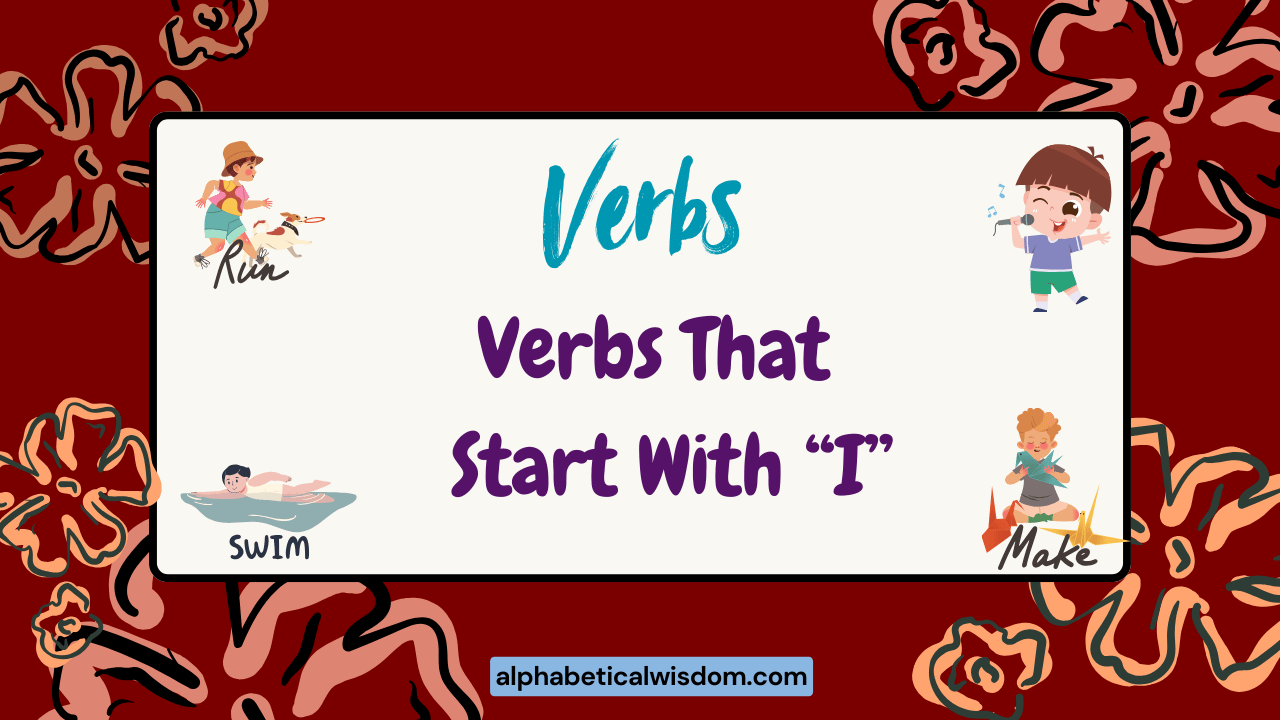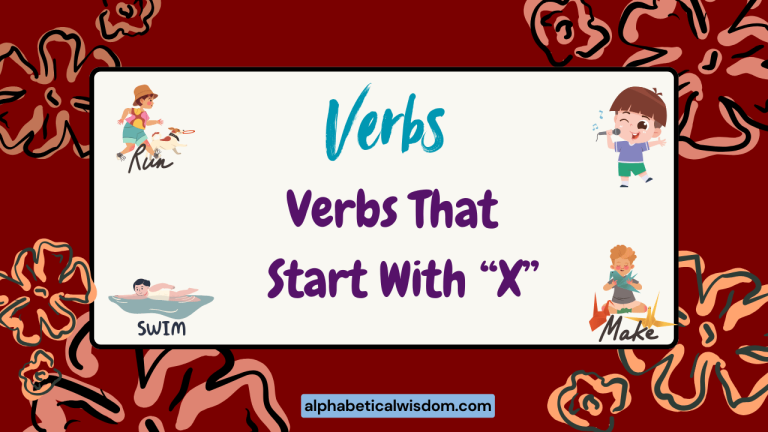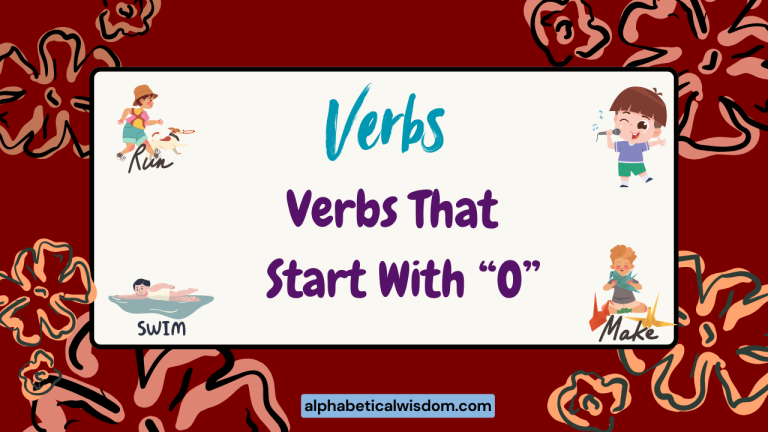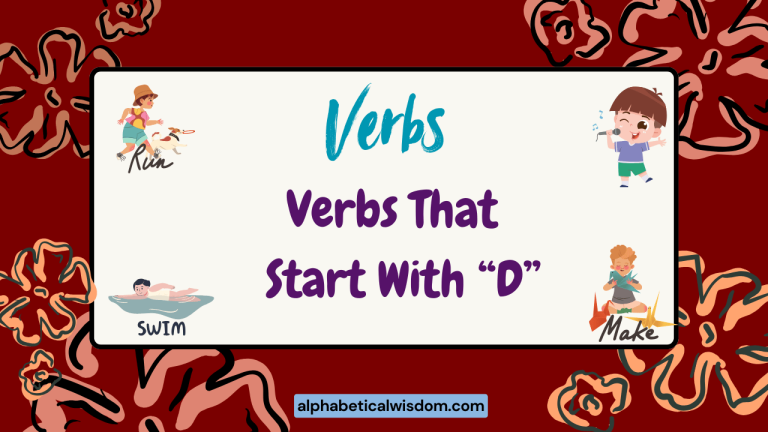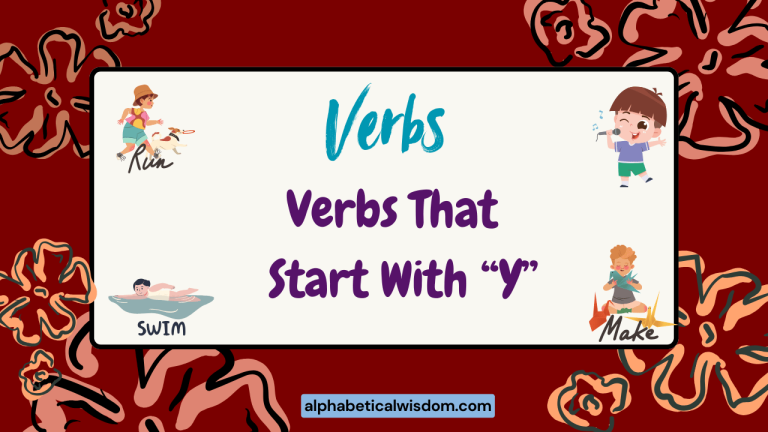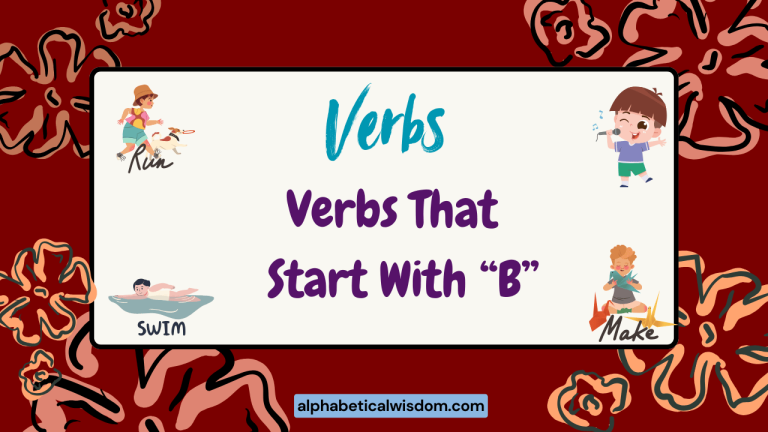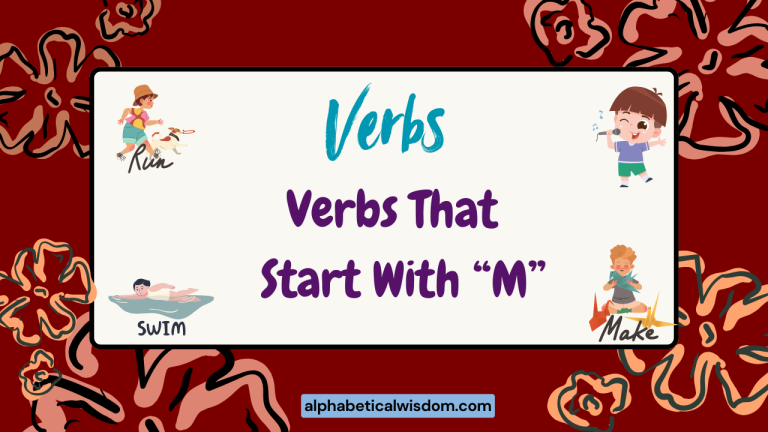Verbs Starting With I: A Comprehensive Guide to Usage and Examples
Understanding verbs is crucial for constructing grammatically correct and meaningful sentences. Verbs that start with the letter “I” are diverse and play various roles, from describing actions and states to indicating processes and experiences.
This article provides a detailed exploration of these verbs, offering definitions, examples, usage rules, and practice exercises. Whether you’re a beginner or an advanced learner, this guide will help you master the use of “I” verbs and enhance your overall English proficiency.
Table of Contents
- Introduction
- Definition of Verbs Starting with I
- Structural Breakdown
- Types and Categories of Verbs Starting with I
- Examples of Verbs Starting with I
- Usage Rules for Verbs Starting with I
- Common Mistakes with Verbs Starting with I
- Practice Exercises
- Advanced Topics
- Frequently Asked Questions
- Conclusion
Definition of Verbs Starting with I
Verbs are words that describe an action, occurrence, or state of being. Verbs that start with the letter “I” function just like any other verb in the English language.
They can express a wide array of activities, mental states, or processes. These verbs are essential for constructing sentences that accurately convey meaning and provide a clear understanding of the subject’s actions or condition.
Understanding the nuances of each verb is key to mastering their usage.
Verbs can be categorized based on their function and how they interact with other elements in a sentence. These categories include action verbs (describe actions), stative verbs (describe states of being), transitive verbs (take a direct object), and intransitive verbs (do not take a direct object).
Some verbs starting with “I” can fall into multiple categories depending on the context.
Structural Breakdown
The structure of sentences containing verbs starting with “I” follows the standard English sentence structure: Subject + Verb (+ Object/Complement). The verb must agree with the subject in number (singular or plural) and tense (present, past, future).
Understanding the basic sentence structure is critical for using these verbs correctly.
For example, in the sentence “I imagine a world of peace,” “I” is the subject, “imagine” is the verb, and “a world of peace” is the object. The verb “imagine” is in the present tense and agrees with the singular subject “I”.
Different tenses will change the verb form, such as “I imagined a world of peace” (past tense) or “I will imagine a world of peace” (future tense).
Understanding how auxiliary verbs (e.g., “will,” “have,” “be”) interact with verbs starting with “I” is also important for forming different tenses and aspects. For instance, “I am improving my skills” uses the auxiliary verb “am” to form the present continuous tense.
Types and Categories of Verbs Starting with I
Action Verbs
Action verbs describe physical or mental actions. They indicate what the subject is doing.
Action verbs that start with “I” are commonly used to express activities, processes, or deliberate actions.
Stative Verbs
Stative verbs describe a state of being, a condition, or a mental state rather than an action. These verbs often relate to thoughts, emotions, relationships, senses, or states of existence.
Stative verbs are generally not used in the continuous tenses.
Transitive Verbs
Transitive verbs require a direct object to complete their meaning. The direct object receives the action of the verb.
Transitive verbs starting with “I” are often used to show the impact of an action on something or someone else.
Intransitive Verbs
Intransitive verbs do not require a direct object. The action of the verb is complete in itself and does not need to act on anything else.
Intransitive verbs starting with “I” often describe actions or states that are self-contained.
Irregular Verbs
Irregular verbs do not follow the standard pattern of adding “-ed” to form the past tense and past participle. They have unique forms that must be memorized.
Examples include verbs like “inlay” (inlaid, inlaid) and “interweave” (interwove, interwoven), although there are fewer common irregular verbs starting with “I” compared to other letters.
Examples of Verbs Starting with I
Action Verb Examples
The following table provides examples of action verbs starting with “I” used in sentences. These verbs describe specific actions or activities performed by the subject.
| Verb | Sentence |
|---|---|
| Ignite | The match can ignite the dry wood. |
| Illustrate | The artist will illustrate the children’s book. |
| Imitate | The child likes to imitate his older brother. |
| Immerse | She likes to immerse herself in a good book. |
| Impact | The new policy will impact many small businesses. |
| Impair | Drinking alcohol can impair your judgment. |
| Implement | The company will implement the new software next month. |
| Imply | His silence seemed to imply agreement. |
| Import | The country needs to import more grain this year. |
| Impose | The government decided to impose new taxes. |
| Impress | He tried to impress her with his knowledge. |
| Improve | Regular exercise can improve your health. |
| Inaugurate | The new president will be inaugurated in January. |
| Incentivize | The company wants to incentivize employees to work harder. |
| Include | The recipe should include all the necessary ingredients. |
| Incorporate | The new design will incorporate several modern elements. |
| Increase | The company expects sales to increase next quarter. |
| Indicate | The sign will indicate the direction to the park. |
| Induce | The medicine might induce drowsiness. |
| Influence | His parents influence him greatly. |
| Inform | Please inform me of any changes. |
| Inject | The doctor will inject the patient with the vaccine. |
| Injure | Careless driving can injure someone. |
| Inspect | The mechanic will inspect the car. |
| Inspire | The teacher tried to inspire her students. |
| Install | They will install the new equipment tomorrow. |
| Instruct | The guide will instruct us on how to use the equipment. |
| Insult | He didn’t mean to insult anyone with his comment. |
Stative Verb Examples
The following table provides examples of stative verbs starting with “I” used in sentences. These verbs describe states of being, conditions, or mental states.
| Verb | Sentence |
|---|---|
| Identify | I identify as a creative person. |
| Idealize | She idealizes her childhood memories. |
| Imagine | I imagine a world without war. |
| Imply | His words imply a deeper meaning. |
| Include | The price includes all taxes and fees. |
| Involve | The job involves a lot of travel. |
| Infer | I infer from his silence that he disagrees. |
| Intend | I intend to finish this project by Friday. |
| Interpret | I interpret his actions as a sign of affection. |
| Involve | The project involves collaboration with multiple teams. |
| Illustrate | This example illustrates the point I’m trying to make. |
| Imply | Her tone implies she’s not happy with the situation. |
| Indicate | The data indicate a positive trend. |
| Involve | The new role will involve more responsibility. |
| Interest | History interests me a lot. |
| Intrigue | The mystery intrigues me. |
| Infer | From the evidence, we can infer that he was involved. |
| Implicate | The evidence seems to implicate him in the crime. |
| Imply | His statement implies that he knew more than he admitted. |
| Incorporate | The new design incorporates elements from different cultures. |
| Involve | The job involves a lot of teamwork and communication. |
| Isolate | The research aims to isolate the key factors contributing to the problem. |
| Integrate | The software is designed to integrate seamlessly with existing systems. |
| Interpret | Experts interpret the data in different ways. |
| Itemize | The bill will itemize all the charges. |
| Imagine | Can you imagine what the future will be like? |
| Illustrate | Let me illustrate my point with an example. |
Transitive Verb Examples
The following table provides examples of transitive verbs starting with “I” used in sentences. These verbs require a direct object to complete their meaning.
| Verb | Sentence | Direct Object |
|---|---|---|
| Identify | She can identify the bird by its song. | the bird |
| Ignite | He ignited the campfire with a match. | the campfire |
| Illustrate | The artist illustrated the story with beautiful drawings. | the story |
| Imitate | The parrot imitates human speech. | human speech |
| Implement | The company implemented the new policy last month. | the new policy |
| Import | The country imports oil from the Middle East. | oil |
| Impress | He tried to impress his boss with his hard work. | his boss |
| Include | The recipe includes all the necessary ingredients. | all the necessary ingredients |
| Increase | The company increased its profits this year. | its profits |
| Indicate | The sign indicates the direction to the beach. | the direction |
| Inform | Please inform me of any changes. | me |
| Inject | The nurse injected the patient with the medication. | the patient |
| Inspect | The mechanic inspected the car for any damage. | the car |
| Inspire | The speaker inspired the audience with his words. | the audience |
| Install | They will install the new software tomorrow. | the new software |
| Instruct | The teacher instructed the students on the assignment. | the students |
| Insult | He didn’t mean to insult anyone with his comment. | anyone |
| Integrate | The software integrates data from various sources. | data |
| Invest | The company will invest millions in new technology. | millions |
| Invent | The scientist invented a new type of solar panel. | a new type of solar panel |
| Isolate | The researchers were able to isolate the virus. | the virus |
| Itemize | The bill will itemize all the charges. | all the charges |
| Imagine | I can’t imagine life without the internet. | life |
| Illustrate | The example illustrates the concept clearly. | the concept |
| Imply | His silence implied consent. | consent |
| Implicate | The evidence implicates him in the crime. | him |
Intransitive Verb Examples
The following table provides examples of intransitive verbs starting with “I” used in sentences. These verbs do not require a direct object.
| Verb | Sentence |
|---|---|
| Imagine | I imagine often in my spare time. |
| Increase | The demand for organic food continues to increase. |
| Interfere | Don’t interfere in other people’s business. |
| Inquire | Please inquire at the front desk. |
| Improve | My health is starting to improve. |
| Increase | The noise level began to increase. |
| Intrude | I didn’t mean to intrude. |
| Involve | The study will involve many participants. |
| Improvise | The musicians had to improvise during the concert. |
| Interact | Children interact well with animals. |
| Investigate | The police will investigate further. |
| Issue | Concerns began to issue from the community. |
| Improvise | The actors had to improvise when they forgot their lines. |
| Interact | The students interact well in group projects. |
| Intervene | The teacher had to intervene in the argument. |
| Investigate | The detectives will investigate the crime scene. |
| Issue | Problems began to issue after the software update. |
| Immigrate | Many people immigrate to find better opportunities. |
| Improve | His skills continue to improve with practice. |
| Increase | The population is expected to increase significantly. |
| Inquire | You should inquire about the details of the program. |
| Insist | He tends to insist on having his own way. |
| Intercede | A mediator had to intercede to resolve the dispute. |
| Interface | The new software is designed to interface more smoothly with existing systems. |
| Interject | He tends to interject his opinions into every conversation. |
| Interlock | The pieces are designed to interlock tightly. |
| Intermarry | Historically, different cultures would often intermarry. |
| Interpret | The way people interpret events can vary greatly. |
| Interrupt | It’s impolite to interrupt someone while they’re speaking. |
| Interview | The company will interview candidates next week. |
Usage Rules for Verbs Starting with I
Tense Agreement
Verbs must be in the correct tense to accurately reflect the time of the action or state. Using the wrong tense can lead to confusion and miscommunication.
Ensure that the verb tense matches the intended time frame.
For example, “I imagine a different future” (present tense) refers to a current thought or belief. “I imagined a different future” (past tense) refers to a thought or belief from the past.
“I will imagine a different future” (future tense) refers to a future thought or belief.
Subject-Verb Agreement
The verb must agree with its subject in number. Singular subjects take singular verbs, and plural subjects take plural verbs.
This is a fundamental rule of English grammar. Subject-verb agreement is crucial for creating grammatically correct sentences.
Examples: “I imagine” (singular subject “I” takes the base form of the verb). “They imagine” (plural subject “they” takes the base form of the verb).
With third person singular subjects, the verb usually ends in -s: “He imagines”.
Infinitive vs. Gerund
Some verbs starting with “I” can be followed by either an infinitive (to + verb) or a gerund (verb + -ing). The choice between the two can affect the meaning of the sentence.
Understanding the specific rules for each verb is essential.
For example, “I intend to improve my skills” (infinitive) expresses a specific intention. “I enjoy improving my skills” (gerund) expresses a general enjoyment of the activity.
Common Mistakes with Verbs Starting with I
One common mistake is using stative verbs in continuous tenses when they should not be. For example, saying “I am imagining” when “I imagine” is more appropriate, especially when referring to a state of mind.
Another common error is incorrect subject-verb agreement. For example, “They imagines” is incorrect; it should be “They imagine.”
Misusing transitive and intransitive verbs is also frequent. For example, incorrectly using “increase” transitively when it should be intransitive, or vice versa.
The correct usage depends on whether the verb takes a direct object or not.
| Incorrect | Correct | Explanation |
|---|---|---|
| I am imagining a better world. | I imagine a better world. | “Imagine” is a stative verb and not typically used in the continuous tense. |
| They imagines a brighter future. | They imagine a brighter future. | The verb “imagine” must agree with the plural subject “they.” |
| The company increased. | The company increased its profits. | “Increase” requires a direct object in this context. |
| I am intending to go. | I intend to go. | “Intend” is not typically used in the continuous tense. |
| He is interesting in history. | He is interested in history. | Correct adjective form is “interested”. |
Practice Exercises
Exercise 1: Identifying Verbs
Identify the verbs starting with “I” in the following sentences.
| Question | Answer |
|---|---|
| 1. I imagine a world of peace and harmony. | imagine |
| 2. The company will implement the new policy next month. | implement |
| 3. The scientist will investigate the phenomenon. | investigate |
| 4. She tried to impress her boss with her dedication. | impress |
| 5. The recipe includes all the necessary ingredients. | includes |
| 6. The sign indicates the direction to the museum. | indicates |
| 7. I intend to finish this project by Friday. | intend |
| 8. The artist illustrated the story with beautiful drawings. | illustrated |
| 9. They will install the new software tomorrow. | install |
| 10. The medicine might induce drowsiness. | induce |
Exercise 2: Verb Tense
Choose the correct tense of the verb starting with “I” in the following sentences.
| Question | Answer |
|---|---|
| 1. Yesterday, I (imagined/imagine) a flying car. | imagined |
| 2. The company (implements/will implement) the new system next year. | will implement |
| 3. Scientists (investigate/are investigating) the new virus right now. | are investigating |
| 4. She (impressed/impresses) her boss every day with her work ethic. | impresses |
| 5. The recipe (included/includes) all the necessary ingredients. | includes |
| 6. The book (inspired/inspires) many readers over the years. | has inspired |
| 7. I (intend/intended) to call you yesterday, but I forgot. | intended |
| 8. The artist (illustrated/illustrates) the children’s book last year. | illustrated |
| 9. They (install/installed) the new equipment last week. | installed |
| 10. The noise (increased/increases) gradually as the crowd grew larger. | increased |
Exercise 3: Subject-Verb Agreement
Choose the correct form of the verb starting with “I” to agree with the subject.
| Question | Answer |
|---|---|
| 1. I (imagine/imagines) a world without poverty. | imagine |
| 2. The company (implements/implement) new policies regularly. | implements |
| 3. Scientists (investigates/investigate) complex phenomena. | investigate |
| 4. She (impress/impresses) everyone with her intelligence. | impresses |
| 5. The recipe (include/includes) a secret ingredient. | includes |
| 6. They (intend/intends) to travel to Europe next summer. | intend |
| 7. The artist (illustrate/illustrates) children’s books. | illustrates |
| 8. He (install/installs) new software on his computer. | installs |
| 9. The team (improve/improves) their skills with practice. | improves |
| 10. We (inquire/inquires) about the details of the program. | inquire |
Advanced Topics
Subjunctive Mood
The subjunctive mood is used to express wishes, suggestions, or hypothetical situations. Verbs starting with “I” can appear in the subjunctive mood, often in sentences expressing a desire or recommendation.
For example: “I suggest that he invest more time in his studies.” Here, “invest” is in the subjunctive mood, expressing a suggestion. This form is often used after verbs like “suggest,” “recommend,” “demand,” or “insist.”
Phrasal Verbs with I
Phrasal verbs consist of a verb and a preposition or adverb, which together create a new meaning. Although less common, some phrasal verbs start with “I,” such as “iron out” (to resolve difficulties) or “impose upon” (to take advantage of someone).
For example: “We need to iron out the details before we finalize the contract.” This means we need to resolve any remaining issues or difficulties. “I don’t want to impose upon your generosity.” This means I don’t want to take advantage of your kindness.
Frequently Asked Questions
- What is the difference between ‘imply’ and ‘infer’?
Imply means to suggest something indirectly, while infer means to deduce something from evidence or reasoning. The speaker implies, and the listener infers. For example, “His silence implied agreement” (he suggested agreement without saying so). “I infer from his silence that he agrees” (I deduced his agreement from his silence).
- When should I use the infinitive form after a verb starting with ‘I’?
Use the infinitive form (to + verb) after verbs like ‘intend,’ ‘incline,’ and ‘hesitate’ to express a purpose or intention. For example, “I intend to finish this project.”
- How do I know if a verb starting with ‘I’ is transitive or intransitive?
A transitive verb requires a direct object to complete its meaning, while an intransitive verb does not. To determine if a verb is transitive, ask yourself if the verb acts upon something. If the answer is yes, it’s transitive. If not, it’s intransitive. For instance, in “I ignited the campfire,” ‘ignited’ is transitive because it acts upon ‘the campfire.’ In “The demand increased,” ‘increased’ is intransitive because it doesn’t act upon anything.
- Are verbs starting with ‘I’ ever used in the passive voice?
Yes, transitive verbs starting with “I” can be used in the passive voice. For example, “The new policy was implemented by the company.” Here, “implemented” is the past participle of the verb “implement” and is used in the passive construction.
- Can you provide more examples of irregular verbs that start with ‘I’?
While less common, “inlay” is an example: inlay, inlaid, inlaid. “interweave” is another, though slightly less common: interweave, interwove, interwoven. Remember that irregular verbs do not follow the standard -ed ending for past tense and past participle forms.
- What is the difference between ‘include’ and ‘incorporate’?
Include means to contain something as part of a whole, while incorporate means to integrate something into a larger entity or system. For example, “The recipe includes flour, sugar, and eggs” (contains these ingredients). “The design incorporates elements from different cultures” (integrates these elements into the design).
- How can I improve my vocabulary of verbs starting with ‘I’?
Reading widely, using a dictionary or thesaurus, and practicing writing regularly can help expand your vocabulary. Pay attention to how different verbs are used in context and try to incorporate them into your own writing and speaking.
- What are some common collocations with verbs starting with ‘I’?
Common collocations include: “implement a plan,” “increase profits,” “induce sleep,” “inspire creativity,” and “install software.” Collocations are words that frequently appear together, and learning them can improve fluency.
- How do auxiliary verbs affect the meaning of verbs starting with ‘I’?
Auxiliary verbs (e.g., “be,” “have,” “do”) are used to form different tenses, aspects, and moods. For example, “I am imagining” (present continuous) describes an ongoing action, while “I have imagined” (present perfect) describes an action completed at an unspecified time in the past. The choice of auxiliary verb significantly impacts the meaning of the verb.
- Is it correct to say “I am interesting in…”?
No, the correct phrasing is “I am interested in…”. “Interesting” is an adjective that describes
the quality of something that evokes curiosity or interest, while “interested” is an adjective
describing a state of being engaged or curious about something.
Conclusion
Mastering verbs that start with the letter “I” is essential for effective communication in English. This guide has provided a comprehensive overview of these verbs, including their definitions, structural breakdown, categorization, usage rules, common mistakes, and practice exercises.
By understanding and applying the principles outlined in this article, you can enhance your English proficiency and communicate with greater clarity and precision. Keep practicing and exploring new ways to use these verbs in your writing and speaking to achieve fluency and confidence.
